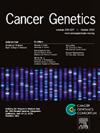The Interplay of N6-Methyladenosine and Ferroptosis in Cancer: A Promising Therapeutic Avenue
IF 2.1
4区 医学
Q4 GENETICS & HEREDITY
引用次数: 0
Abstract
Chemoresistance is an obstacle to the efficacy of chemotherapy in cancer. Numerous preclinical and clinical investigations have concentrated on mitigating drug resistance; nevertheless, chemoresistance remains a predominant challenge. Recent findings strongly suggest that ferroptosis, a form of non-apoptotic cell death characterized by lipid peroxidation, has been associated with resistance to cancer therapies, and the induction of ferroptosis has been shown to reverse drug resistance. The most common epitranscriptomic modification N6-methyladenosine (m6A) regulates cancer progression by enhancing the stability of oncogenes. Recent evidence suggests that dynamic m6A modifying factors play a role in chemosensitization by increasing the ferroptosis susceptibility. This review explores the mechanisms and significance of ferroptosis, including the role of m6A modifications in regulating ferroptosis-related genes. We discuss potential strategies for enhancing m6A-mediated ferroptosis to increase the effectiveness of chemotherapeutic treatments. Understanding the role of m6A modifications in regulating ferroptosis and their impact on the tumor cell response to chemotherapy could lead to identifying novel therapeutic targets, enhancing the effectiveness of chemotherapy and potentially overcoming chemoresistance.

n6 -甲基腺苷和铁下垂在癌症中的相互作用:一个有前途的治疗途径
化疗耐药是影响肿瘤化疗效果的一大障碍。许多临床前和临床研究都集中在减轻耐药性上;然而,化疗耐药仍然是一个主要的挑战。最近的研究结果强烈表明,铁下垂(ferroptosis)是一种以脂质过氧化为特征的非凋亡细胞死亡形式,与癌症治疗的耐药性有关,而铁下垂的诱导已被证明可以逆转耐药性。最常见的外转录组修饰n6 -甲基腺苷(m6A)通过增强癌基因的稳定性来调节癌症的进展。最近的证据表明,动态m6A修饰因子通过增加铁下垂的易感性在化学致敏中发挥作用。本文就铁沉的发生机制及意义进行综述,包括m6A修饰在调控铁沉相关基因中的作用。我们讨论了增强m6a介导的铁下垂的潜在策略,以提高化疗治疗的有效性。了解m6A修饰在调节铁凋亡中的作用及其对肿瘤细胞对化疗反应的影响可能有助于发现新的治疗靶点,提高化疗的有效性,并有可能克服化疗耐药。
本文章由计算机程序翻译,如有差异,请以英文原文为准。
求助全文
约1分钟内获得全文
求助全文
来源期刊

Cancer Genetics
ONCOLOGY-GENETICS & HEREDITY
CiteScore
3.20
自引率
5.30%
发文量
167
审稿时长
27 days
期刊介绍:
The aim of Cancer Genetics is to publish high quality scientific papers on the cellular, genetic and molecular aspects of cancer, including cancer predisposition and clinical diagnostic applications. Specific areas of interest include descriptions of new chromosomal, molecular or epigenetic alterations in benign and malignant diseases; novel laboratory approaches for identification and characterization of chromosomal rearrangements or genomic alterations in cancer cells; correlation of genetic changes with pathology and clinical presentation; and the molecular genetics of cancer predisposition. To reach a basic science and clinical multidisciplinary audience, we welcome original full-length articles, reviews, meeting summaries, brief reports, and letters to the editor.
 求助内容:
求助内容: 应助结果提醒方式:
应助结果提醒方式:


